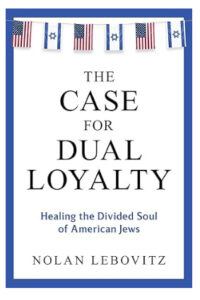The Case for Dual Loyalty: Healing the Divided Soul of American Jews by Rabbi Nolan Lebovitz; Wicked Son publishers; ISBN 9798888-458532; 144 pages; $18.99.
By Rabbi Dr. Michael Leo Samuel

 CHULA VISTA, California — As a pulpit rabbi, I frequently engage with congregants navigating the intricate landscape of identity in America, sometimes hearing the complex sentiment, “I am an American first, a Jew second.” This statement, reflecting layers of history, assimilation, security, and sometimes defensiveness, forms the crucial backdrop against which Rabbi Nolan Lebovitz’s timely and groundbreaking new book, The Case for Dual Loyalty, arrives.
CHULA VISTA, California — As a pulpit rabbi, I frequently engage with congregants navigating the intricate landscape of identity in America, sometimes hearing the complex sentiment, “I am an American first, a Jew second.” This statement, reflecting layers of history, assimilation, security, and sometimes defensiveness, forms the crucial backdrop against which Rabbi Nolan Lebovitz’s timely and groundbreaking new book, The Case for Dual Loyalty, arrives.
Lebovitz, Senior Rabbi at Valley Beth Shalom and a Fulbright Scholar, doesn’t shy away from this historically charged term; instead, he confronts and boldly reclaims it, arguing that holding multiple deep loyalties is not a liability but a potential source of strength and civic enrichment. His unique position—merging the insights of a communal leader familiar with these very pastoral conversations, the depth of an academic, and perhaps the narrative clarity of a filmmaker—equips him well for this ambitious undertaking.
Lebovitz’s work feels particularly urgent today. The persistent antisemitic trope of dual loyalty sadly resonates with polling data suggesting nearly a third of Americans doubt the primary allegiance of their Jewish neighbors to the United States, often assuming greater loyalty to Israel. This echoes the anxieties I sometimes perceive even within my own community, where the desire to affirm American belonging can stem from historical pressures to assimilate, gratitude for American acceptance, or a need to preempt unfounded accusations.
Most rabbis who defend Israel against criticism from within the academic community, or who minister to politically outspoken members, can certainly appreciate Lebovitz’s willingness to engage directly with sensitive political moments that highlight these tensions.
For instance, he addresses the Obama administration’s Iran policy, noting Obama’s 2014 statement that Iran could become a “very successful power” (p. 37) and observing how this approach created deep divisions: “Obama’s Iran policy caused a great chasm within the Jewish community. We were forced to side with the worldview of President Obama and the Iran Deal or side with Prime Minister Benjamin Netanyahu…”
To add insult to injury, Lebovitz points out, “In one of his last acts President, Obama’s two terms ended with a final slap at Israel. In December 2016, he… officially abstained and unofficially aided the passing of UN Security Resolution 2334…”
By tackling such examples, Lebovitz steps directly into the sensitive terrain where Jews have historically sought acceptance by emphasizing their American identity, sometimes creating a perceived hierarchy with their Jewishness. His book aims not just to refute the negative stereotype but to fundamentally reframe the value of multifaceted identity in the American tapestry.
Drawing from his scholarly work, Lebovitz constructs a sophisticated argument weaving together history, religious insights, and social commentary. He posits that the ability to maintain profound connections to both American civic life and Jewish tradition, peoplehood, and even Israel, reflects a mature and complex understanding of identity suited to our modern, interconnected world.
Rather than viewing these allegiances as being in conflict or representing a zero-sum game, he suggests they can be mutually reinforcing, enriching one’s contributions as both an American and a Jew. This framework offers a valuable counter-narrative, providing language and concepts that I believe could be helpful in the identity discussions I facilitate.
Published by Wicked Son, Lebovitz’s work distinguishes itself through its assertive stance. Compared to other thoughtful examinations of Jewish-American identity, such as Robert H. Mnookin’s The Jewish American Paradox, Lebovitz’s direct engagement with and reappropriation of the “dual loyalty” label is uniquely forceful and potentially transformative.
However, this bold strategy is not without risks. From my pastoral perspective, I recognize the difficulty this approach might pose for congregants who have personally experienced the sting of this accusation or view the term as irrevocably poisoned by antisemitism. Reclaiming such language requires careful navigation, and some may understandably question whether it ultimately serves the community’s best interests. Many of us have sadly lost members because we advocate for Israel’s right to live and thrive—a stance rooted in deep historical awareness.
As a child of a Holocaust survivor, my generation carries the heavy lesson that when enemies declare their intent to destroy us, we must take their threats seriously; this historical trauma undoubtedly informs the sensitivities around loyalty and external perception within the community.
Despite this valid concern, Lebovitz’s The Case for Dual Loyalty is an undeniably significant contribution. It pushes readers—Jewish and non-Jewish alike—to critically examine ingrained assumptions about loyalty, identity, and belonging in a pluralistic society. For rabbis and communal leaders like myself, seeking to help congregants integrate their American experiences with their Jewish heritage, Lebovitz provides challenging insights and a fresh vocabulary.
His work doesn’t necessarily resolve the “American first, Jew second” sentiment, but it powerfully reframes the underlying values, suggesting that embracing the fullness of one’s multiple commitments can lead to a richer, more engaged, and ultimately more loyal form of citizenship. This book is essential reading for anyone grappling with these complex issues today.
*
Rabbi Michael Leo Samuel is spiritual leader of Temple Beth Shalom in Chula Vista, California.
Making my way through Rabbi Lebovitz’s book, I came back to Louis Brandeis’s response to the question of dual loyalty and Zionism, written almost 100 years ago.
Brandeis asks a simple question: Why is the Jew insecure with his identity? Why is the Jew insecure with the millennia-old link to Israel and the hope of Jewish return?
Brandeis noted, Why must the Jew always self-justify their existence and their link to their heritage? Irish Americans and Italian Americans do not have to self-justify their existence or their link to their heritage the way that a Jew does.
The foundation of the taunt that makes Jews fearful is insecurity, history, and anti-antisemitism. Jews have a long, long, long history of “removal” from wherever they have lived. The Irish and the Italians did not and do not have that history.
To sum up Lebovitz, Jews, be proud of who you are, your heritage, your faith, your identity as Americans, and your link to Israel. If Jews want absolute guarantees, they are delusional. The absolute guarantee for Jews is to embrace their path to God, who they are, their fellow Jews, and Israel.
Every other people, or ethnic identity in America, embraces themselves and their heritage as Americans with pride. Jews should and must as well. We have much to be proud of as Americans and Jews.